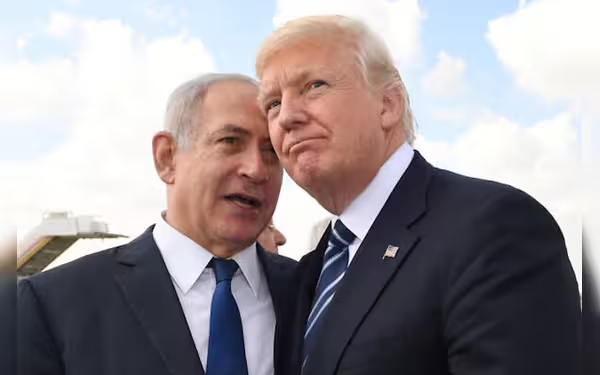Saturday, November 16, 2024 05:52 PM
Trump's Challenges in Middle East Peace Efforts
- Trump's impulsive promises face Middle East complexities.
- Qatar halts mediation efforts between Israel and Hamas.
- U.S. influence in negotiations remains minimal.
 Image Credits: asiatimes
Image Credits: asiatimesAs Trump returns, the complexities of Middle East peace negotiations pose significant challenges.
Donald Trump’s recent re-election as the President of the United States has stirred significant discussions, especially regarding the Middle East, a region known for its complex and often volatile political landscape. As Trump prepares to take office once again, he has made bold promises, including a commitment to end all wars. His approach is characterized by impulsiveness and unpredictability, as he has vowed to resolve the ongoing Ukraine conflict within just 24 hours of his inauguration. Additionally, he aims to assist Israel in swiftly concluding its military operations in Gaza and Lebanon.
However, the Middle East is not a straightforward puzzle. Trump will face considerable challenges in balancing his strong support for Israel with his broader ambitions in the region. The dynamics between Iran and Saudi Arabia are shifting, adding another layer of complexity to an already intricate situation. One significant development that occurred amidst the U.S. election was Qatar's announcement that it has paused its role as a mediator for a ceasefire between Israel and Hamas. This tiny, oil-rich emirate has invested considerable effort over the past year to broker peace, leveraging its close ties with both the United States and Hamas, whose political leadership operates from Doha.
Despite Qatar's diligent efforts, the results have been less than promising. The only notable outcome was a brief ceasefire last year, which allowed for the release of over 100 Israeli hostages in exchange for 240 Palestinian prisoners. The reasons for the lack of progress are multifaceted. A primary issue is the inability of both sides to overcome key sticking points. Israeli Prime Minister Benjamin Netanyahu has made it clear that he intends to eliminate Hamas entirely, dismissing the idea of a temporary truce. On the other hand, Hamas is calling for a complete cessation of hostilities and a total withdrawal of Israeli forces from Gaza.
Moreover, the role of the United States in these negotiations has been minimal. While the Biden administration has consistently expressed its desire for a ceasefire, it has not exerted any significant pressure on Israel, relying instead on diplomatic language that has not translated into concrete action.
As Trump prepares to step back into the political arena, the question remains: Can he truly navigate the intricate web of Middle Eastern politics? The challenges are immense, and the stakes are high. The region's future hangs in the balance, and the hopes for peace may be more elusive than ever. Ultimately, the success of any peace initiative will depend not only on the actions of the U.S. but also on the willingness of both Israel and Hamas to engage in meaningful dialogue. The world watches closely, hoping for a breakthrough that has long been anticipated but remains frustratingly out of reach.













